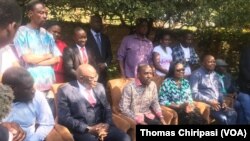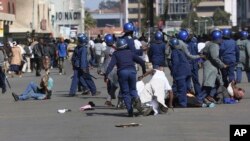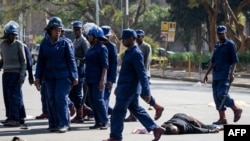Zimbabwe is under heavy international scrutiny after a High Court upheld a decision by the regulating authority for Harare Central District, Friday, to ban a planned protest by the opposition Movement for Democratic Change (MDC).
The United Nations High Commission for Human Rights urged the Zimbabwe government to guarantee freedom of speech.
“State authorities have a duty to ensure people’s rights to freedom of expression, and to facilitate and protect the right to peaceful assembly,” said spokesperson, Rupert Colville.
Despite the ban, issued on the eve of the demonstrations, hundreds of MDC supporters still turned out to heed the MDC call, before being dispersed by police, who patrolled the streets on foot and in armored vehicles.
Videos and pictures captured of the interaction between citizens and police showed many running away from police, and others being beaten with baton sticks or being kicked by police.
In a tweet issued late Friday, U.S. Assistant Secretary of State for Africa, Tibor Nagy, wrote, “We condemn the excessive force the police used today against Zimbabweans who were seeking to demonstrate peacefully. We call on Zimbabwe’s security forces to respect human rights and to exercise restraint.”
MDC vice president Tendai Biti said many people were hurt during the clashes, including the lead up to the planned demonstrations where he said 70 people were arrested and more than 18 abducted.
“There was massive brutality,” said Biti. “Over seven people have been assaulted including a journalist. One of those people who was assaulted was a woman, who the police quickly threw into an ambulance. She could be dead, we don’t know,” said Biti. “I can’t confirm that.”
Zimbabwe’s information ministry released a tweet acknowledging two injuries, and an alleged assault on a journalist, which was being investigated, and a “case of harassment,” for which “a formal apology (was) offered by police and accepted,” read the tweet.
The Zimbabwe Republic Police also acknowledged in a statement that 91 people, mostly youth, "were arrested for various offenses in Chitungwiza, Harare Central Business District and Harare South."
The police statement, however, disputed claims of violence, and dismissed as false, reports that police shot or injured protesters.
“We have also noted with concern falsehoods by some online publications that the police shot into the crowds and killed two people, which is false,” the statement by the Zimbabwe Republic Police stated. “No live rounds were used by the police. No one was shot or injured by police through firearms.”
The
MDC Promises More Demonstrations
Sounding defiant after the botched demonstrations, MDC leader Nelson Chamisa told journalists at a press conference, that his party was not deterred by the ban, nor the heavy deployment of police.
“We are going to purse every avenue,” said Chamisa. “There is not going to be any rest until the people of Zimbabwe achieve a people’s government. A people’s government is only going to be a creature of a settlement that has to come through comprehensive reforms, through a transitional mechanism, through understanding that the roadmap that we have put on the table is followed,” Chamisa said.
Echoing this position, Biti, who described the ban on their demonstration as “unconstitutional, unfair and disrespectful” given the advance notice, said they will proceed with their demonstrations in Bulawayo, Gweru, Masvingo and Mutare next week as planned, and they have notified police.
“We will not surrender and give up the constitutional right we have in terms of Section 59 of the Constitution of Zimbabwe,” said Biti. “We will not rest. We will not rest until there is a change in this country.”
However, , Simon Khaya Moyo, former information minister and an official in the office of President Emmerson Mnangagwa, urged the MDC to embrace peace and abandon further plans to demonstrate, saying they will not solve the problem.
“We all believe all Zimbabweans, patriotic Zimbabweans abhor any kind of violence, and I think to me really, and to us as a party, this is the time for the nation to unite and address the economic challenges facing us as a family, as one family, as a country, irrespective of our political affiliations,” said Moyo.
“I think these economic challenges are affecting everyone, it doesn’t just affect Zanu-PF members or MDC members or any other members of any other political party. So we must, I believe find solutions to these challenges together, than to be violent, and to be throwing insults at each other. That doesn’t solve the problem,” Moyo said.
A Zanu-PF Member of Parliament, Kindness Paradza, too challenged the MDC to accept Mnangagwa’s invitation to hold dialogue, rather than demonstrating. Paradza accused the MDC of trying to take over power by force.
“They think they can take over the country by force, but that won’t happen,” said Paradza. “They said they wanted elections. We went to the elections and beat them. They have to wait for the next election and not cause violence.”
Chamisa and his party has maintained that Mnangagwa is an illegitimate leader, and have rejected his efforts to engage in dialogue, to find solutions to the end the economic and social hardships gripping the country.
Chamisa said Mnangagwa’s government was worse than that of former longtime leader, Robert Mugabe, who was forced out of office in November 2017, by the military.
“What is clear is that its turning out that the regime in Harare is far worse than the (former President Robert) Mugabe regime,” said Chamisa. “One would be persuaded to think that Mugabe is back, but you then realize that this is not Mugabe at his best – Mugabe has become a toddler when it comes to the kind of brutality that we are seeing,” Chamisa said.
At the heart of the MDC’s call for demonstrations is frustration over the state of the economy, which has resulted in shortages of basic necessities such as cash, fuel, electricity, water and bread.
Spokesperson for the UN Commission on Human Rights, Rupert Colville, urged the government to address the economic crisis.
"We are deeply concerned by the socio-economic crisis that continues to unfold in Zimbabwe," said Colville.
"While acknowledging efforts made by the Government, the international community and the UN in Zimbabwe to mitigate the effects of the crisis and reform process, the dire economic situation is now impacting negatively on the realization of the economic and social rights of millions of Zimbabweans.”






